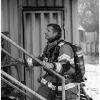Congratulations! You’ve been promoted to battalion chief – a huge honor at any organization.
You did the work, proving you could successfully manage a crew, run a fire scene and manage the personnel side of the house.
As you look toward this next stage of your career, you’ll likely experience several emotions – pride, excitement and anxiety, to name a few.
I know because I’ve been there. In June 2021, I completed my first year as a battalion chief in my organization. As I reflect on the past 365 days in my position as a shift commander, it’s clear that the first 100 days are critical in setting the stage for your management style. Following are some tips to help you survive your first 100 days as a battalion chief. And complete the form on this page to download a copy of these guiding tips.
You’re not the person who came before you
Unless your position was newly created within your organization, you will be filling a vacated position due to promotion, retirement or other circumstances. For the most part, your subordinates will be accustomed to the routine of how things were done with your predecessor. Influence and culture are two very powerful factors in the fire service, and regardless of how “good” or “bad” the previous boss was, your new direct reports will bring their experiences to the transition period. This can certainly impact how quickly they accept you in the new role.
I’ve heard the expression “It is better to follow a zero rather than a hero” more than a few times. I can agree that the basis for this is probably true; however, you can’t buckle under the external stress to be like the person before you, even if he or she was a “hero.”
YOU were promoted for a reason; therefore, you have an obligation to infuse your skills, your personality and your ideas into your new position. Being the same only gets you the same. New perspectives and growth will be a good thing for you and your shift to experience. So, decorate the office how you want to, and lead your own way.
Take the time to meet with your members and exchange expectation
When I promoted, I immediately carved out time to sit down and listen to my team members – individually. I asked them questions and encouraged their recommendations for how they felt the shift could improve in relation to operations. Most of the people (nearly 50) all commented on how they’d love to see more shift- and company-level training opportunities, and how they wanted more transparency and improved communication in order to plan their days. My response: You got it. During these meetings, I also explained to them my vision for the shift and let them ask any questions they wanted.
This dialogue impacted the overall buy-in and helped break down any initial barriers. I used the information gained from these meetings as a basis to construct my personal expectations and mission for the shift, which were presented to the officer corps. These meetings also helped me make informed personnel moves with the goal of improving service delivery and operational capabilities on the shift level.
Have this same meeting with your boss, too. It is extremely helpful to exchange expectations and discuss each other’s plan for how things should be implemented and function overall. Invite them to shift training evolutions, and solicit feedback after significant incidents or events. I think these meetings are so impactful in building relationships and establishing trust early on.
Establish a rapport with your mutual-aid counterparts and other BCs
An often-overlooked function of team dynamics is how well your people operate on mutual-aid incidents. If you are part of an organization that relies on mutual aid frequently, then it is critical to establish a relationship with your mutual-aid partners. That being said, I highly recommend you establish relationship with other battalion chiefs regardless of how often mutual-aid incidents occurs. If you work for a large department with several battalion chiefs on duty, start scheduling some meeting times pronto.
You’ll want to discuss operational expectations and responsibilities with these BCs right away. Furthermore, don’t discount other important players like EMS officers and police command officers with whom you may routinely respond to incident scenes.
Be visible and present
Don’t wear out your comfortable chair. Get out and about, particularly in your first 100 days. Attend company training evolutions, or better yet, schedule some for your companies to conduct. It is your job to know the capabilities of the people who work on your shift, especially the officers. Observe and offer constructive feedback. Additionally, provide an incident command perspective for the companies while the complete a drill in order for them to understand how their job impacts the overall incident plan. Discuss key elements like communication or tactical weaknesses.
Training with your companies helps instill confidence in one another. This will impact how your officers make decisions and improve incident operations as a team. In addition, take advantage of any opportunity to conduct an after-action review or post-incident analysis with your crews after significant incident. These are important tools for learning and improving together.
Good luck!
I hope that these suggestions will help you succeed in your first 100 days as a battalion chief.
Again, congratulations on your promotion! Now get out there and get to know your team.
[Complete the form on this page to download a copy of these tips.]
This article, originally published in May 2021, has been updated.














